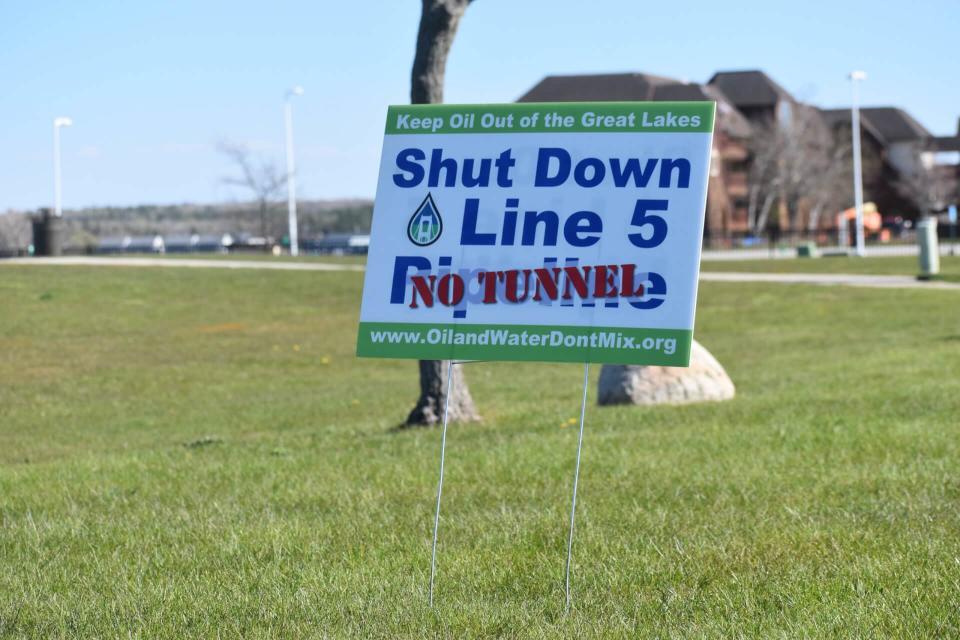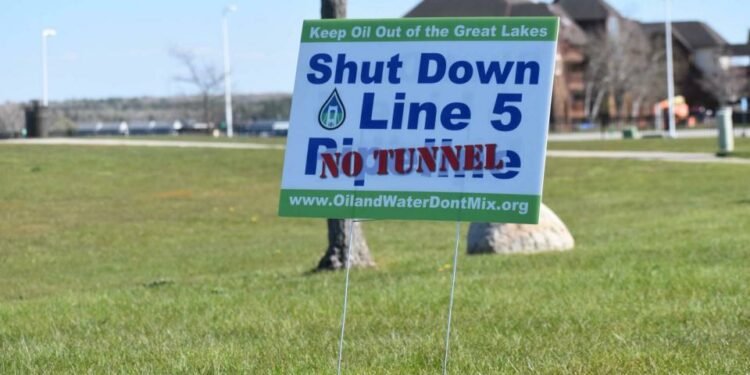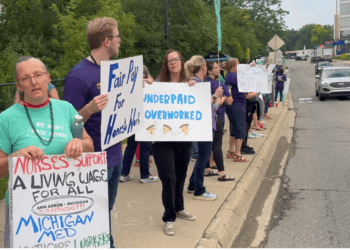Michigan Attorney General Dana Nessel gathers with environmental advocates and tribal community members in Cincinnati, Ohio ahead of oral arguments on Line 5 litigation on March 21, 2024. (Screenshot)
Michigan’s Sixth Circuit Court of Appeals on Friday rejected a request to rehear its decision to return Michigan Attorney General Nessel’s case against Line 5 to state court, keeping the case in Ingham County’s 30th Circuit Court.
While Nessel initially filed the case to shut down the controversial pipeline in 2019 in state court, where it was litigated for more than a year, Enbridge later filed successfully to have the case moved to federal court.
Although Nessel requested to have the case returned to state court from the U.S. District Court’s Western District of Michigan, her initial request was denied. However after requesting an interlocutory appeal, the Court of Appeals determined the case should be heard in the state.
While Enbridge sought to have the decision reheard by the Court of Appeals entire bench of judges, as opposed to the usual three judge panel, their request was denied.
“Our lawsuit to shut down Line 5 belongs in state court, as the federal court of appeals ruled in June, and affirmed today,” Nessel said in a statement.
“It is a critical responsibility of the State to protect our Great Lakes from the threat of pollution. Our state claims, brought under our state law, will continue to be heard in a state court, and I am grateful we are one step closer to resolving this case on behalf of the state of Michigan,” She said.
For many years Tribal Nations and environmental advocates have fought for the shutdown of the 645 mile pipeline, which shuttles 22.68 million gallons of crude oil and natural gas liquids through the Straits of Mackinac daily.
After an Enbridge line spilled about 21,000 barrels of heavy crude oil into a Kalamazoo River tributary in 2010, Enbridge came under increased scrutiny for Line 5, with opponents warning a spill from the pipeline into the Straits of Mackinac would be catastrophic.
Enbridge spokesperson Ryan Duffy said the company was disappointed in the court’s decision Friday, reiterating the company’s belief that the case properly belongs in federal court. However, Nessel’s case is only one of multiple legal battles tied to Line 5, with Enbridge filing a complaint against Michigan Gov. Gretchen Whitmer following Whitmer’s 2020 order to the Michigan Department of Natural Resources terminating Enbridge’s easement to operate in the Straits of Mackinac.
While Whitmer requested the Western District Court of Michigan dismiss the case on the grounds of sovereign immunity, which provides governments immunity from lawsuits, District Judge Robert Jonker rejected the request, finding Enbridge’s case fell under one of sovereign immunity’s exceptions.
“Even though the Attorney General’s case has been remanded to Michigan state court, Enbridge remains confident that the dispute should be fully resolved by the pending summary judgment motion in Enbridge’s separate lawsuit in Enbridge v. Whitmer,” Duffy said.
“If the federal district court rules in Enbridge’s favor on the summary judgment motion, that ruling should fully resolve the Attorney General’s action. For this reason, Enbridge believes that the pending motions for summary judgment should be resolved by the federal court before the Attorney General’s case proceeds in Michigan state court,” Duffy said.
The company also remains focused on its Great Lakes tunnel project, Enbridge’s proposed solution to concerns of a pipeline spill in the Straits of Mackinac.


The project, which would relocate the dual pipelines into a concrete-lined tunnel embedded in the bedrock in the straits, has received two of the three permits needed to begin construction and is awaiting the final permit from the U.S. Army Corps. of Engineers with a decision expected in 2026.
However, the permits issued by the Michigan Public Service Commission (MPSC) and the Michigan Department of Environment, Great Lakes and Energy (EGLE) are facing multiple challenges from Indigenous communities and environmentalists.
“The MPSC made a bad decision, plain and simple. Although we fought to be heard, they put on their blinders and chose to ignore the critical perspective of Tribal Nations throughout the Great Lakes,” Bay Mills Indian Community President Whitney Gravelle said in a statement issued alongside the Bay Mills Indian Community, Grand Traverse Band of Ottawa and Chippewa Indians, Little Traverse Bay Bands of Odawa Indians, and Nottawaseppi Huron Band of the Potawatomi notice that they would appeal the MPSC permit.
“It’s important to remember that Enbridge does not yet have the final permit they need from the US Army Corps of Engineers to build the tunnel project. As we appeal the MPSC’s disastrous decision, we also demand and expect that the Army Corps conduct a thorough and meaningful environmental impact statement and uphold the treaty trust responsibilities of the United States,” Gravelle said.
SUBSCRIBE: GET THE MORNING HEADLINES DELIVERED TO YOUR INBOX
Source link : http://www.bing.com/news/apiclick.aspx?ref=FexRss&aid=&tid=66c044dd4a6046ff840c58fe001ad998&url=https%3A%2F%2Fnews.yahoo.com%2Fnews%2Fnessel-line-5-case-remain-225530309.html&c=2614274103124347733&mkt=en-us
Author :
Publish date : 2024-08-16 11:55:00
Copyright for syndicated content belongs to the linked Source.






